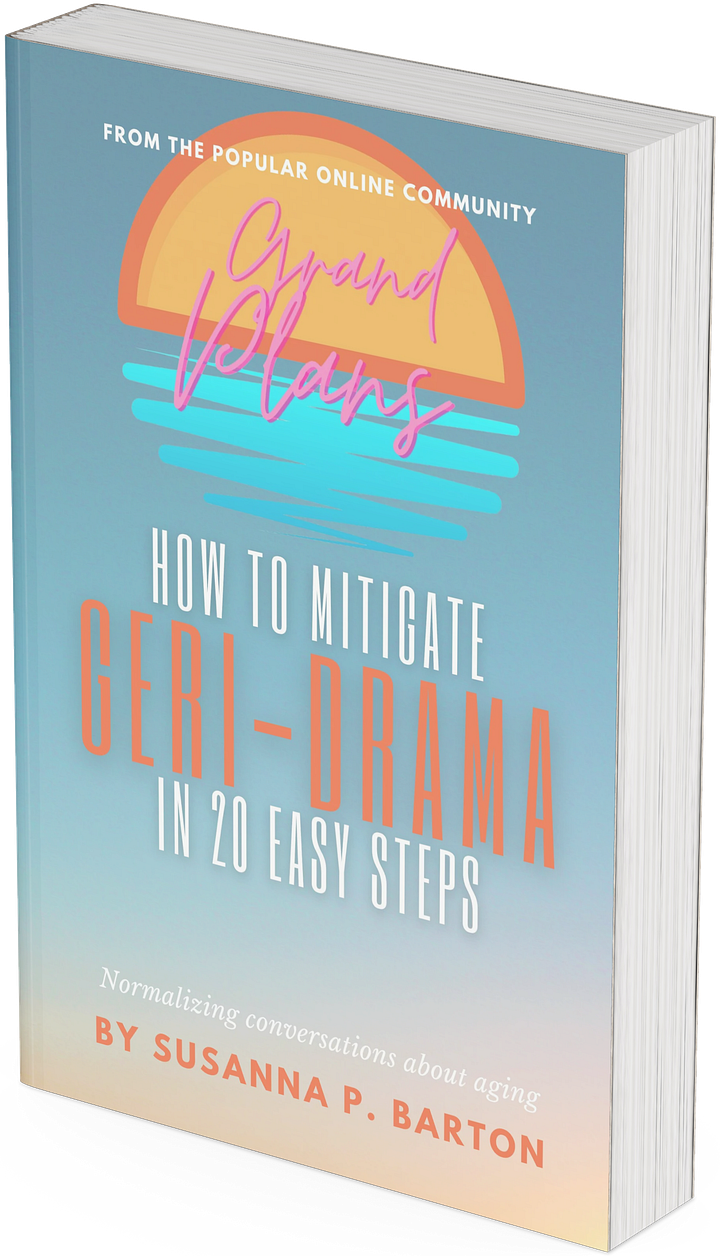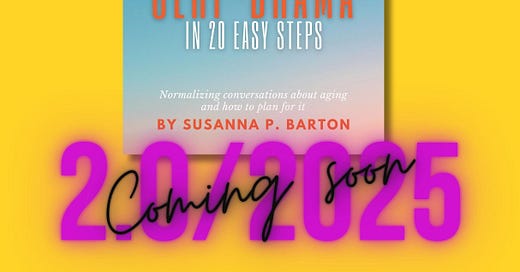Grand Plans: April 10, 2025
A semi-monthly newsletter from Grand Plans designed to normalize and celebrate our glorious geri-destiny through information, stories, real talk conversation, smart planning and shared experience.
Things I’m prattling on about today
Recently, through my Gerontology masters work and general interwebs perusal, I've come across a few essential resources for advance directives planning that are a must for this important task. So let's get right to business, here they are:
PrepareForTheirCare.org: This website includes a cache of informative direction. "The PREPARE programs were developed by Dr. Rebecca Sudore, MD out of a deep passion to help empower people and their family, friends, and caregivers to obtain and understand medical information and to make informed medical decisions." The website includes resources on how to help yourself and other people with medical decision planning, easy-to-access advance directives and primers on such topics as how to bring up the topic of medical planning, how to ask people about their wishes and how to say yes (or no!) to being "the person" for someone else.
The Conversation Project: Another very cool website that encourages conversation about advance directives and how to make good on them. The Conversation Project® is "a public engagement initiative of the Institute for Healthcare Improvement (IHI). Our goal is both simple and transformative: to help everyone talk about their wishes for care through the end of life, so those wishes can be understood and respected." The website features some super cool guides including a Conversation Starter Guide, Guides to Choosing and Being a Healthcare Proxy and a What Matters to Me Guide among many other resources. Very helpful. I am Zoom-attending a Conversation Project program about Who Do You Trust through a Dallas-based temple next week and I'm very excited about it.
Five Wishes: This nonprofit organization bills itself as "the nation's only national advance care planning program. Providing peace-of-mind for more than 25 years." This program is a gold standard in advance directives conversation and planning. I've heard some debate amongst friends on whether or not the documents hold up legally in all cases, but there is no question Five Wishes is a go-to resource and renowned, reliable national expert in this area of Grand Planning. Worth a visit fo sho.
And lastly, this very handy, extremely easy-to-use AARP database that directs you to your state's printable advance directives paperwork. In 10 minutes, you can knock out your advance directives according to the laws of your state and feel very relieved and accomplished and awesome. Do it today!
That's all I have for you today. Making good on your advance directives is one of the most loving, generous and thoughtful acts you can do for yourself and the people who love and care for you.
News you can use
Need more explaining? This Kiplinger article lays out some of the essential points of advance planning here:
“When it comes to advance directives, there are several types. Here are some useful terms related to advance directives.
Living will: As mentioned above, a living will provides guidance in the case of terminal illness if you become unable to make decisions about your care. It dictates the treatments you do and don’t want in such a situation.
Medical power of attorney (POA): A medical POA designates someone you trust to make medical decisions for you if you cannot do so. Importantly, a medical POA gives the person the authority only to make medical decisions on your behalf — not financial decisions. Another term for a medical POA is a health care power of attorney or health care proxy.
Provider orders for life-sustaining treatment (POLST): This document is a portable medical order that informs healthcare providers and facilities about your wishes for end-of-life interventions, including emergency medical care.
Medical orders for life-sustaining treatment (MOLST): This form enables people to dictate their end-of-life care. It can include whether you want to be resuscitated, intubated, or put on a ventilator.
Do-not-resuscitate (DNR) order: This order tells health-care providers not to implement cardiopulmonary resuscitation, better known as CPR, if you stop breathing or your heart stops beating.
Mental health or psychiatric advance directive (PAD): This directive allows someone with mental illness to express their treatment preferences before a crisis occurs in case they become unable to make their wishes known. The legal guidelines for PADs vary by state. PADs are a fairly new tool for patients and clinicians alike.
Medical directive: This is another name for an advance directive.
This list is not exhaustive, but these are the main documents that might be included in an advance directive.”
Here’s an interesting piece on breaking the taboo of living wills in India. Advance planning is an important global initiative that we can all get behind!
Shelf life
Coming soon! And until then you can still purchase one of these bad boys on Amazon or at your local bookstores.


Grand Plans the OG and the Grand Planner can help walk you through all the great ways to talk to your friends and family about your plans for the second half of life!
Some golden gedunk and goods
Get yourself another few copies of Grand Plans: How to Mitigate Geri-Drama in 20 Easy Steps and the Grand Planner for all the people who like getting gifts in your life! Visit www.mygrandplans.com for links to purchase on Amazon.
And… Check out our Grand Plans merch in our Etsy storefront.











